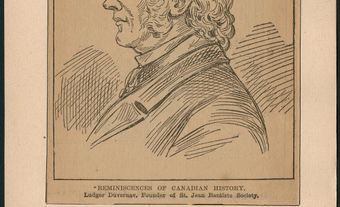This article was originally published in Maclean's Magazine on January 10, 2000
iCrave TV Controversy
William Craig's red eyes betray how busy he has been lately. He gets six hours sleep most nights, but says it doesn't help when overseas media phone at 2 a.m. for an interview. Still, all the attention that comes from holding a hot hand as an Internet upstart is unquestionably flattering. As the founder and controlling shareholder of iCraveTV.com, Craig is the frontman for the bold Toronto-based company that streams television signals across the Net. There's just one problem. Craig never bothered to ask producers, broadcasters and a host of other television industry players whether they would mind if he rebroadcast their copyrighted programming without paying a cent.
It turns out they mind very much. So far, Craig has received (and ignored) cease-and-desist letters from the Canadian Association of Broadcasters, the Canadian Film and Television Production Association and four broadcasters in Buffalo, N.Y., among others. Neither was he swayed by the New York City-based National Football League, which also demanded iCraveTV stop what it is doing. "The NFL has to realize that in Canada we have different football rules," Craig says. "We also have different copyright rules."
How those rules apply and to whom will keep lawyers busy in the coming months. Industry watchers now expect copyright holders to sue iCraveTV for infringement. Meantime, Craig, 46, has garnered a lot of attention by doing something no one else has: "Web-casting" 17 TV channels - including CBC, CTV, ABC, CBS, NBC, PBS and Fox - live and for free. Craig, a former program director and special marketing manager for what is now Rogers Communications Inc., owner of Maclean's, claims what he is doing is perfectly legal. He says it is no different from what cable companies did more than 30 years ago when they first snatched TV signals off the airwaves and redistributed them without paying for the programming.
Bill Sweetman, vice-president of Internet strategy at MultiMediator Strategy Group Inc., a Toronto-based research firm, says the buzz surrounding iCraveTV bodes well for its parent, TVRadioNow Corp., and for a possible future sale or public share offering. Sweetman is convinced the company has expertly exploited the Copyright Act. "Craig and his legal advisers have identified a legal loophole," says Sweetman, "and pretty well driven a Mack Truck right through it."
The courts have yet to determine whether the Copyright Act has such a loophole. For the time being, though, Craig is exploiting this legal grey zone in the following manner: iCraveTV uses two aerial antennas in Thornhill, Ont., 20 km north of Toronto, to capture Canadian and U.S. TV signals off the airwaves originating in Toronto, Barrie, Ont., and across Lake Ontario in Buffalo. According to the Copyright Act, it is not an infringement of copyright for a so-called retransmitter to take such signals and rebroadcast them live without alteration. This is, in part, what cable companies do now. But unlike iCraveTV, cable companies pay a tariff for every subscriber who is out of the range of airborne signals. That tariff is then shared among copyright holders in Canada, and is worth about $50 million a year. Craig says he is willing to pay such a tariff, but iCraveTV's critics liken this to stealing a car, then offering to pay for it.
Certainly the whole business, in which Craig says he and fellow investors have sunk $12 million, is fraught with legal questions. Visitors to iCraveTV's site must read a legal disclaimer almost 3,000 words long. It says anyone who wants to watch iCraveTV, which began broadcasting on Nov. 30, must reside and use a computer in Canada. Viewers are asked to provide their telephone area code as verification. Dennis Wharton, senior vice-president of corporate communications at the National Association of Broadcasters in Washington, scoffs at the security measure, saying nothing prevents Internet users anywhere in the world from entering a phoney Canadian area code. "The safeguard against theft of the signal from U.S. stations," says Wharton, "is close to being a joke."
A pivotal question in this high-stakes legal wrangle is whether iCraveTV qualifies as a retransmitter the way cable companies do under the Copyright Act. The act states what a retransmitter is not, but not what it is. Mario Bouchard, general counsel for the Copyright Board, the federal regulator empowered to establish the tariffs to be paid for the use of copyrighted works, says the law will decide. "ICraveTV may or may not be a retransmitter, we don't know," says Bouchard. Asked who will answer the question, Bouchard replies: "Potentially the board, ultimately a court of law."
Last May, concerned over hindering the competitive advantage of new media services, the Canadian Radio-television and Telecommunications Commission announced it would not regulate the Internet. Then on Dec. 17, while the controversy surrounding iCraveTV raged, the CRTC by coincidence issued a public notice stating it will exempt all new media broadcasters from requiring a broadcast licence. The decision, say industry observers, will play a prominent role in determining whether iCraveTV is in breach of copyright.
For all the fuss surrounding iCraveTV, what viewers often see is of decidedly mediocre quality. Without a high-speed connection and a powerful computer, the picture is jerky and the sound just adequate. Still, that hasn't stopped people from swarming the site. Craig estimates that in December, iCraveTV will have garnered close to 800,000 different visitors for such fare as Ally McBeal and The Practice. "The interesting thing about the Internet," says Craig, "is that the person who can get there first tends to hold the position."
For the time being, Craig plans on selling banner ads for the site to generate revenue. This month, he expects to announce a new venture in which iCraveTV will broadcast video of Toronto-based executives reporting their quarterly results. He also wants to negotiate deals to broadcast specialty channels. There are plans to raise an antenna in Vancouver early in the new year to retrieve the city's broadcast signals and those originating in Seattle, which will no doubt raise the ire of more copyright holders. "Some of the broadcasters going after William Craig are underestimating him as an opponent," says Sweetman at MultiMediator. "He's not a 21-year-old working in his basement. He's an accomplished professional who has done his homework." Now, Craig is out to teach others a lesson.
How to Log On and Tune In
Watching television on iCraveTV.com is similar to watching TV in the early days of black and white, says William Craig, iCrave's chief executive. The experience depends, he says, on the quality of the equipment used to watch. To get started, viewers need a current copy of RealPlayer, which can be downloaded free from www.realplayer.com. (Unfortunately, running RealPlayer requires a lot of computer memory, and on older systems makes other programs either sluggish or even impossible to operate.)
To get the most out of iCraveTV, Craig recommends the following:
FOR A PC
Processor: Pentium 200mhz MMX
Sound: Any soundcard with speakers
RAM Memory: 32 megabytes
Operating System: Windows 95/98/NT
FOR A MAC
Processor: PowerPC
Operating System: MacOS 8.1
RAM Memory: 32 megabytes
Maclean's January 10, 2000

 Share on Facebook
Share on Facebook Share on X
Share on X Share by Email
Share by Email Share on Google Classroom
Share on Google Classroom


